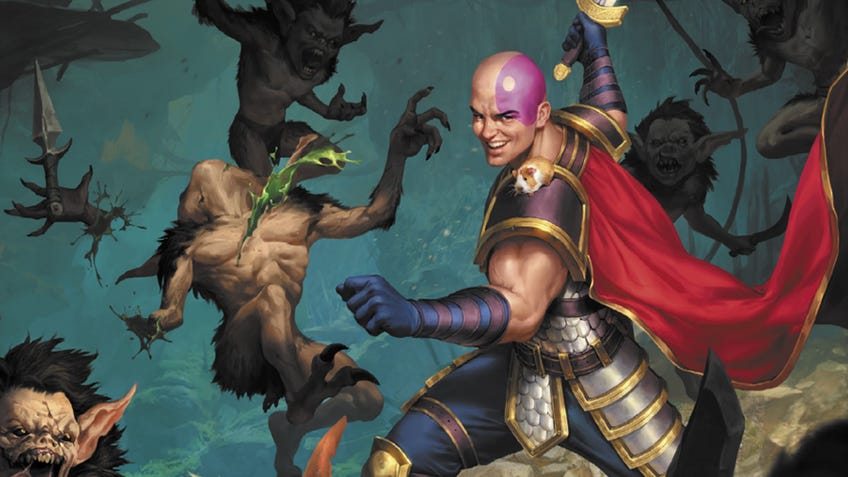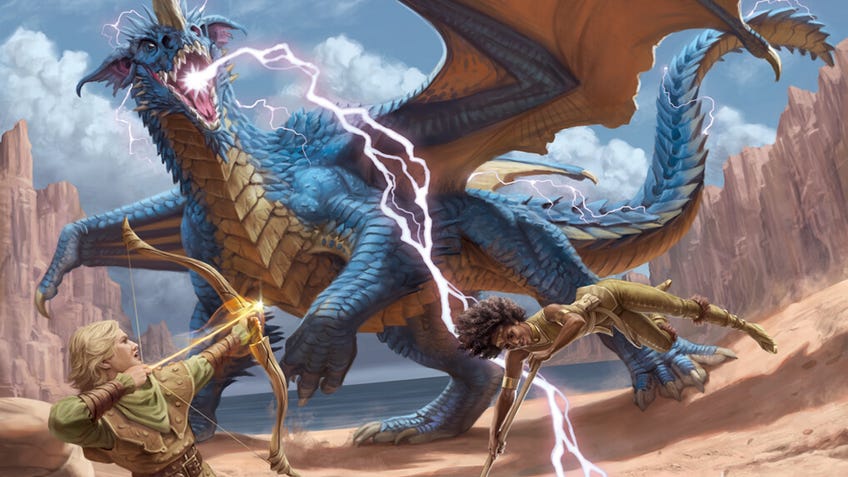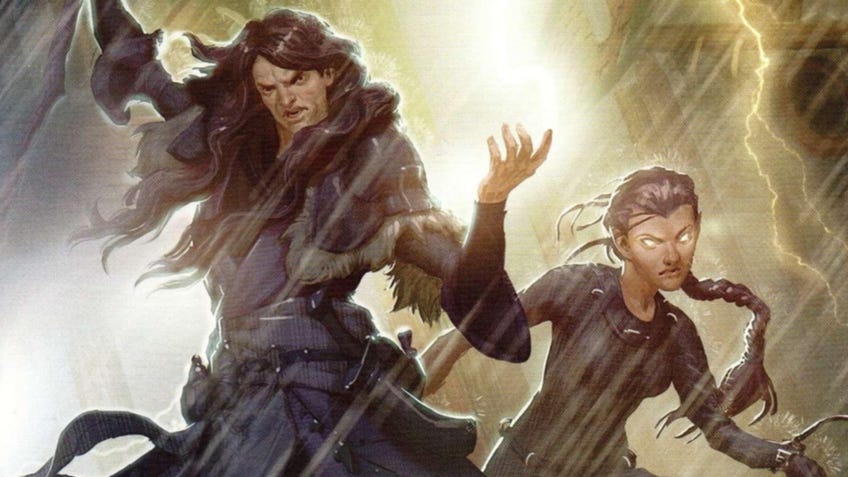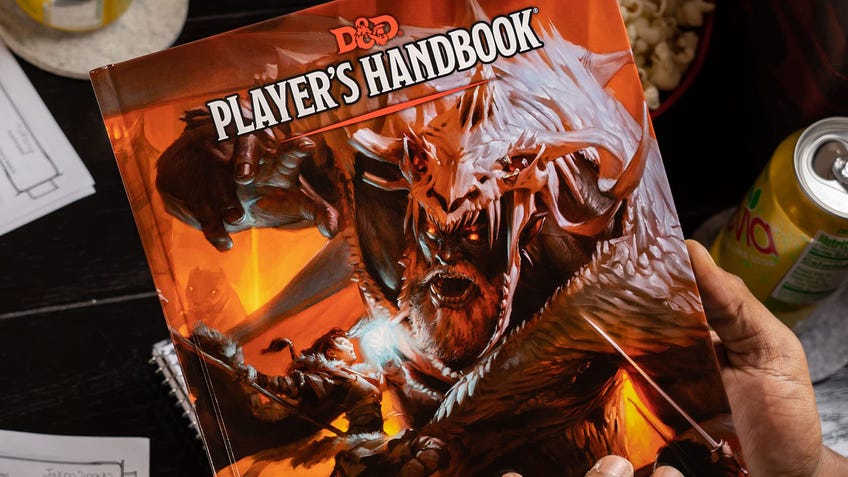Newest One D&D playtest update is the biggest yet - includes changes to five classes, weapons and spells
Monk changes coming at a later date.
The latest update to the playtest for One D&D is the largest yet – featuring a total of five classes, as well as changes to spells and weapons.
The Player’s Handbook Playtest 5 is the newest update made to the Unearthed Arcana playtest materials for One D&D, the next edition for the tabletop roleplaying game Dungeons & Dragons. Whilst previous editions featured perhaps one or two major elements, with some smaller aspects on the side, the most recent playtest contains an overview of what five core classes could look like in One D&D.
Barbarians in One D&D could see a number of changes from their 5E counterpart. Perhaps the most notable change is to the Dungeons & Dragons class's most iconic feature, Rage, which shifts the focus from taking damage to dealing it. Whilst Rage in D&D 5E requires the player character to take damage to maintain it, in One D&D Rage can be extended through either a bonus action or by forcing someone else to make a saving throw. In the playtest, Rage can now last 10 minutes rather than just one minute and can be stopped by Incapacitation.
Other key changes to the barbarian class in the playtest for the upcoming tabletop RPG include the addition of weapon mastery and primal knowledge – two new feats gained at first and second level – the merging of danger sense and feral instinct, and the moving of indomitable might, brutal critical, persistent rage, primal champion and relentless rage to other levels. Relentless rage will now restore you to a number of hit points equal to twice the barbarian’s level, whilst new feat rage resurgence will restore the use of rage whenever players roll initiative – thereby removing the ability to gain unlimited uses of rage that barbarians usually get at level 20.
The path of the berserker barbarian subclass is also included in the latest update, with frenzy no longer causing the player to gain a level of exhaustion and granting additional damage whenever the player uses reckless attack, rather than as a bonus action. Mindless rage ends charmed and frightened conditions instead of just suspending them, and both retaliation and intimidating presence have been moved to other levels.
Fighters will also see several changes in the Player’s Handbook Playtest 5 update, including alterations to the class’s second wind ability. In the latest update, fighters can use second wind more than once between long rests without requiring a short rest. Meanwhile, action surge can only be used to perform certain fighter-themed actions now, thereby limiting its potential. Other changes include the addition of persuasion on the list of fighter skill list, as well as the weapon mastery feat mentioned in the Barbarian section.

Several feats have moved to other levels, such as weapon expert, improved action surge and three extra attacks. There are multiple new feats added for the fighter in the latest playtest update including weapon adept and unconquerable, with indomitable granting a bonus to players’ rerolls equal to their fighter’s level.
A subclass for the fighter, the champion, has received changes in the latest update – introducing new feats such as adaptable victor, which grants the fighter more noncombat abilities, and heroic warrior. Other changes to the champion are the removal of remarkable athlete – due to its lower-ranking amongst the fighter features – and the survivor feature giving players advantage on death saving throws and upgrading an 18 and 19s to a 20.
The changes to the sorcerer class listed in the latest playtest document for the fantasy RPG emphasis the class’s innate affinity towards magic. The number of spells a sorcerer character can learn over their lifetime is now capped at 22 instead of just 15, thereby fulfilling one of the most requested changes for the class. Other alterations include the addition of a first level feature, innate sorcery, which immediately grants two sorcerer spells. The other newly added sorcerer features include sorcerous vitality, arcane eruption, sorcery incarnate and arcane apotheosis.
Font of magic now requires characters to be a certain level to be able to create spell slots, with higher levels of spell slots being restricted to higher level characters. Metamagic is now a second level feature that gives players three metamagic options rather than just two, with three more being granted at 13th level. New metamagic options have also been added, thereby providing sorcerers with fresh ways to augment their spellcasting. Sorcerous restoration is now a 15th level feature and restores sorcery points whenever the player rolls initiative.
From now on, all sorcery subclasses will be called X sorcery, rather than X bloodline. The draconic subclass has seen some changes in this playtest update, with the draconic resilience feat giving a base AC that’s 10 + the character’s dexterity and charisma modifiers, rather than just 13 + dexterity. Draconic ancestor is now dragon speech – enabling players to communicate with any dragon type creature. The elemental affinity feat does not charge a sorcery point for damage resistance, with draconic exhalation replacing draconic presence and dragon wings modifying the sorcery incarnate feature, as well as adding a damage option.
Warlocks now gain their pact boon at 1st level instead of 3rd, speeding up the rate at which the class acquires their pact benefits. Pact boon also grants eldritch blast, hex and a spell of the player’s choice – which they can pick from one of three groups of spells exclusive to warlocks. The spells players will choose with their pact boon will incorporate several other changes made to warlocks included in the playtest update. Pact magic has now been replaced by spellcasting, which will cap their spell slots to a total of 15 instead of just four. This change is also reflected in the number of eldritch invocations a warlock can cast increasing to nine from eight.

Other changes are to the way the warlock class can acquire its features, such as mystic arcanum now being an eldritch invocation option – which can be gained at fifth level. Several new features have been added to the warlock’s arsenal such as contact patron, enabling characters to directly communicate with their patron, and hex master: allowing a warlock to cast hexes without using spell slots. A list of new eldritch invocations – and changes to existing options – has been included in the Player’s Handbook Playtest 5 for warlocks who are interested in checking them out.
The fiend patron subclass for warlocks has seen some alterations in the latest update, most notably – patron spells replacing the expanded spell list, which allows warlocks to cast certain spells as if they were already prepared and not spend a spell slot doing so. Other changes to the fiend patron subclass can be seen in dark one’s blessing being triggered by an enemy dropping to no hit points within five feet and with characters able to use dark one’s own luck a number of times equal to a player’s spellcasting ability modifier. Fiendish resilience can no longer be bypassed by magic or sliver weapons and hurl through hell can be used if players expend a spell slot that is at least fourth level.
The last class to receive changes in the latest update to the One D&D playtest is the wizard. None of the suggested wizard changes in the update are particularly revolutionary, with a selection of smaller alterations and additions being proposed. Wizard players can now use their spellbook as a spellcasting focus, with a new first level feature collecting all the rules for using a spellbook into a single section as well as granting an entirely unique wizard spell – scribe spell.
Several new wizard features have been added in the update such as academic – which grants advantage to character intelligence when performing the study action – memorise spell and modify spell, which allow wizards to learn and alter spells within their spellbook, as well as create spell: thereby enabling the player to design their own spells by scribing them and modifying them. Other feats are now learnt at different levels, such as spell mastery and signature spells.
Naming conventions for wizard subclasses have changed to remove ‘school of’ in favour of a shorter descriptor of the type of spellcaster. For example, the school of evocation wizard subclass is now just the evoker. The evoker subclass has a couple of changes in evocation savant adding two evocation spells of the player’s choice to their spellbook, as well as potent cantrip working with attack rolls made via cantrips.

Besides the various changes to D&D classes found in the Player’s Handbook playtest 5, there have also been a number of alterations made to the way weapons work in the tabletop RPG. Every weapon in One D&D may have a mastery property which can be unlocked through a specific feature, such as the barbarian and fighter’s weapon mastery feature. Examples of mastery properties include the club having the ability to slow or the halberd having the ability to cleave opponents.
Other changes to weapons found in the update are namely to specific weapons such as the shortsword now being a martial weapon, the net being a piece of adventuring gear instead of a weapon and the musket and pistol now appearing in the Player’s Handbook, rather than the Dungeon Master’s Guide.
As with some previous playtest updates, the latest one contains a list of either brand-new spells or altered versions of spells that have been included in previous versions of Dungeons & Dragons. The list of spells covered in the update is too expansive to entirely cover here. However, one notable change is the removal of the bard spells vicious mockery and dissonant whispers from the arcane spell list, with the promise that these two spells will be available to the bard class in a later update.
The very last core class to receive changes is the monk class, which has been confirmed to be included in a later playtest update.
Players can download the latest playtest update via the Unearthed Arcana website and will be able to give their feedback to the most recent playtest update through a survey set to be released on May 17th.
One D&D is set to be released in 2024, with all currently proposed playtest changes not being guaranteed to make it into the final version of the upcoming RPG edition.




